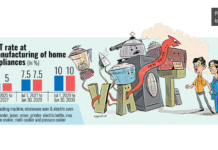New Age
Mostafizur Rahman | Aug 07,2020
The number of beneficiary owners’ accounts has plunged to an 11-year low after 2.70 lakh accounts were scrapped in July due mainly to prolonged bearishness on the primary and secondary markets.
The number of active BO accounts was 25,55,511 on June 30, but the figure declined to 22,86,088 on July 30, according to Central Depository of Bangladesh Limited data.
The number was lowest after June 30, 2009 when it was at 14,19,015.
Of the annulled BO accounts, most of them became void due to the accountholders’ failure to pay the annual fees.
To trade on the stock market and apply for primary shares, an investor has to open a BO account with the CDBL through a depository participant, which is usually a stockbroker or a merchant bank.
Of the 22.86 lakh BO accounts, only 12,26,422 accounts hold shares while 7,34,651 accounts have no shares and 3,38,178 accounts have never been used.
The market was mostly bearish in the last two financial years (2018-19 and 2019-20) with lower participation of investors that made some investors reluctant to renew their BO accounts.
The situation has worsened since January this year after the global outbreak of coronavirus and the DSE core index hit rock bottom in March when the country first detected coronavirus cases and reported the first death after a week of its presence.
To check the free fall on the market amid the pandemic, the Bangladesh Securities and Exchange Commission imposed a floor price system so that no share could fall below a certain level that had sent the market to a near standstill.
The government declared general holidays from March 29 to May 30 to curb the spread of the virus, and trading on the market also remained shut during the period.
DSEX, the key index of the Dhaka Stock Exchange, plummeted by 26.56 per cent to 3,989.09 points on June 30, 2020 from the previous financial year, with the daily average turnover sinking to Tk 381 crore.
Many investors open BO accounts only for getting returns from the primary market subscribing IPO shares, market operators said.
They said that the primary market was also sluggish in the last financial year (2019-20) as only two companies and one bond in the financial year raised only Tk 307 crore, an 11-year low.
As a result, a section of investors were reluctant to renew their BO accounts, they said.
A BO accountholder has to pay Tk 450 as fee to renew his/her account annually. Of the amount, the government gets Tk 200, the BSEC Tk 50, the CDBL Tk 100 and the depository participant concerned Tk 100.
Around 7,000 crore shares worth Tk 21 lakh crore were in the central depository system until July 31.
The number of BO accounts has been declining since June, 2015 when the number was 32.23 lakh as investors apparently saw no development in the market after market debacle in 2009-10, market operators said.
The number of BO accounts was 29.23 lakh on July 31, 2016, 26.57 lakh on July 31, 2017, 26.20 lakh on July 31, 2018 and 25.28 lakh on July 31, 2019.
Market operators also said that the regulator failed to bring any good companies to the market in the last 10 years and it also failed to prevent irregularities and manipulation on the market, and also to diversify the market.
In 1996, the BO account holders were only 25,000 that took eight years to reach 1 lakh in December 2004. However, number of account holders swiftly reached to 10 lakh in January 2007 and 20 lakh in January 2009.
The number of BO accounts reached its peak at around 34 lakh in the fiscal year 2010-11, the year of market bubble-burst, as people rushed to open accounts with different brokerage houses lured by the booming share prices, from October to early December, 2010.









